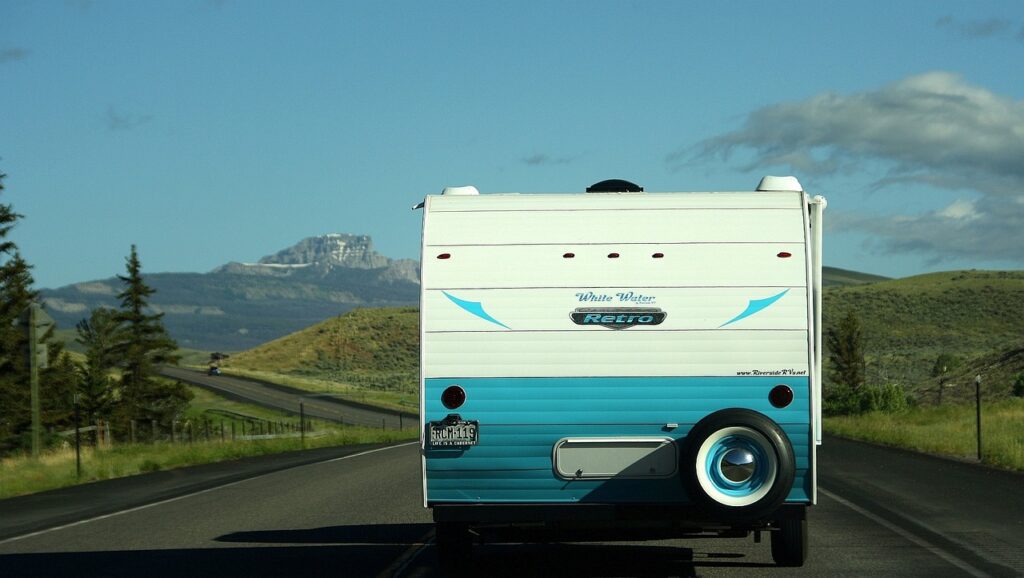Are you planning that dream adventure of exploring the vast and beautiful landscape of Australia in a caravan? And are not wanting to sell everything before you go? Read on for some handy tips on how you can earn some extra cash or a full-time income along the way.
While the travelling lifestyle can be exhilarating and rewarding, it’s essential to have a reliable source of income to sustain your adventures, whether for 6 months, a year or beyond. We have looked at a number of ways you can keep some money flowing in during your adventure and here they are.

1. Remote work
Remote work has become more popular than ever, with companies recognizing the benefits of allowing their employees to work from anywhere. If you have skills in areas such as writing, programming, graphic design, or social media management, you can take advantage of this trend and work from the comfort of your own caravan.
One of the biggest advantages of remote work is the flexibility it offers. You can set your own schedule and work from wherever you please, as long as you have a reliable internet connection. This allows you to explore new destinations while earning a living, making it an ideal option for caravan travellers.
To get started with remote work, you’ll need to be employed with a business offers remote work or find clients that are seeking work done for them. There are many online platforms, such as Upwork, Freelancer, and Fiverr, where you can create a profile and connect with potential clients. These platforms allow you to offer your services to clients from all around the world, giving you the opportunity to work with people from different cultures and backgrounds.
Another option is to look for remote job listings on websites such as Seek, Indeed, and FlexJobs. These websites offer a wide range of remote job opportunities, from entry-level to senior positions, in various industries such as marketing, finance, and customer service.
Pros
Flexibility: With remote work, you have the flexibility and freedom to work from anywhere as long as you have an internet connection. This means you can work on your own schedule and even take breaks to explore your surroundings.
Variation: There are a ton of different types of remote work available, from writing and programming to graphic design and social media management. You can find a type of work that suits your skills and interests.
Cost savings: Working remotely can save you money on commuting, work outfits (goodbye suits, hello boardshorts), and other expenses associated with traditional jobs.
Work-life balance: Remote work can provide a better work-life balance, as you have more control over your schedule and can prioritize your personal life.
Cons
Isolation: Working remotely can be isolating, especially if you are travelling alone. It can be difficult to make connections with colleagues and build a sense of community. But hey, if you are out there exploring there are plenty of people to talk to.
Distractions: Working from a caravan can be challenging due to potential distractions such as noise and limited space. Having young children can impact on when you work.
Inconsistent income: Remote work can be unpredictable, as income can vary depending on the amount of work available and the rates you can charge.

2. Seasonal Work
Finding work in seasonal job can be a great way to experience a new area, meet new people, and earn some money, its win win win! Depending on your interests, you could find work in a resort, vineyard, or farm picking fruit or vegetables during the busy season. While some jobs may require a little more effort than others, but the rewards are well worth it.
One of the best things about seasonal work is that you can work for a few months and then move on to a new location, giving you the freedom to explore different parts of Australia. With shortages of seasonal workers still an issue this can be an easy pickup for you along the way. Additionally, many seasonal jobs offer accommodation or camping options, making it easier to save money on living expenses.
If you’re interested in seasonal work, websites like Back Packer Job Board and Harvest Trail can help you find opportunities across Australia. These websites offer job listings for fruit picking, farm work, and other seasonal jobs in different parts of the country.
Working in the hospitality industry is another option for seasonal work in Australia. During peak tourist seasons, hotels, resorts, and restaurants often need extra staff to meet the demand. Jobs to be on the lookout for may include serving, housekeeping, or front desk work. The hospitality industry can be a great option for those who enjoy working with people and providing excellent customer service.
One thing to keep in mind is that seasonal work can be competitive, so it’s important to apply early and be persistent in your job search. Make sure to update your resume and cover letter regularly and tailor them to the job you’re applying for.
Pros
Flexibility: Seasonal work can often be flexible, allowing you to work for a few months and then take time off to travel or pursue other interests.
Accommodation and meals: Many seasonal jobs come with accommodation and meals included, which can save you money on living expenses.
Meet new people: Working in a seasonal job can be a great way to meet people from all over the world, including locals and other travellers.
Unique experiences: Depending on the job, you may have the opportunity to try new things and gain unique experiences that you might not have had otherwise.
Cons
Uncertainty: Seasonal work can be uncertain, as you may not always have a job lined up or may not know when your job will end.
Physically demanding: Many seasonal jobs, such as fruit picking and farm work, can be physically demanding and may require long hours.
Limited options: While there are many seasonal work opportunities in Australia, the options may be limited depending on the time of year and your location.
Low pay: Seasonal work may not pay as well as other types of jobs, so it’s important to consider whether the lower pay is worth it for the experience.


3. Selling Goods
Consider selling something. This could be your own handmade goods or products online.
Creating and selling handmade products like jewellery, art, or crafts is great way to turn your creative passion into profit. Selling products on websites such as Etsy or eBay has never been easier with so many tutorials out there to get you started. This gives you the flexibility to work on your own terms and choose which products to sell.
If creating physical products like paintings or photographs isn’t your thing, you can still get in on the action by selling products online. Print on demand is one such avenue you can consider where you can create a design, say for a short or mug, sign up with a print on demand supplier and then sell this through an online platform like Etsy.
By selling your goods online, you can reach customers from all over Australia and even around the world. These websites provide a platform for you to showcase your products, handle payment and shipping, and grow your business. That way, you can focus on creating and selling products while the logistics are taken care of for you.
Selling goods at local markets and festivals can also be a great option. This is a perfect opportunity to meet new people, showcase your products, and build your brand. By doing some research, you can find a variety of markets and festivals across Australia to set up shop.
Remember to factor in all costs when selling your goods, such as materials, packaging, shipping, and marketplace or event fees. By pricing your products correctly, you can ensure that you are making a profit while still keeping your customers happy.
Pros
Flexibility: Selling goods online or at local markets and festivals gives you the freedom to work on your own terms and choose which products to sell. You can also work from anywhere as long as you have a stable internet connection.
Creativity: Selling handmade products like jewellery, art, or crafts allows you to express your creativity and turn your passion into profit.
Reach: By selling your goods online, you can reach customers from all over Australia and even around the world. These websites provide a platform for you to showcase your products, handle payment and shipping, and grow your business.
Cons
Costs: Selling goods can come with various costs such as materials, packaging, shipping, and marketplace or event fees. It’s important to factor in all costs when pricing your products to ensure that you are making a profit while still keeping your customers happy.
Competition: With online marketplaces such as Etsy and eBay, there is a lot of competition. It’s important to stand out by creating high-quality products and building your brand.
Time commitment: Running a successful online store or selling at markets and festivals can be time-consuming. It requires dedication and effort to manage your inventory, handle customer inquiries, and fulfill orders.

4. Blogging and Vlogging
Do you love to document your travels and share them with the world? If you have a passion for writing or creating videos, starting a blog or YouTube channel may be just the thing for you. Not only will you have a platform to share your adventures, but with enough followers, you can make money through advertising or sponsored content. Here’s how to get started.
First, choose your niche. What sets your travels apart from others? Do you have a particular interest, such as food or adventure sports? Or do you prefer slow travel, focusing on immersing yourself in local cultures? Do you want to show off how much fun families can have when travelling together? Choose something that resonates with you and your audience.
Next, choose your platform. WordPress is a popular option for blogging, as it offers a variety of templates and is easy to use. Hostinger helps you easily create a blogging website. For vlogging, YouTube is the go-to platform. Both offer free hosting, but if you want to create money from your content, you’ll need to sign up for advertising programs. Again there is a wealth of tutorials out there to help with this process.
Now it’s time to create your content. For blogging, start with a catchy headline and an engaging introduction that hooks your readers. Using high-quality photos and videos will enhance your content and make it more shareable. For vlogging, make sure you have a good camera and microphone (but honestly, most phones with a stand would work perfectly) and plan out your shots and narration ahead of time.
Once you’ve created your content, it’s time to promote it. Share your blog posts or videos on social media, and engage with your audience by responding to comments and questions. Attend travel blogging conferences and meetups to network with other bloggers and learn new skills.
Finally, monetize your content. You can make money through advertising, affiliate marketing, or sponsored content. Affiliate marketing, which is probably the easiest, involves promoting products or services and earning a commission on any sales made through your unique affiliate link. Sponsored content involves creating content in exchange for payment from a brand or tourism board.
Pros
Fun: A great way to document your travels and share them with others
Possible High Earning: Can potentially make money through advertising, affiliate marketing, or sponsored content
New Skills: Allows you to connect with other travel bloggers and learn new skills
Creative: Provides a creative outlet for your travel experiences
Cons
Time: Takes time and effort to create high-quality content
Slow Earning: May take a while to build a following and start making money
Saturated Market: Can be competitive, as there are many travel bloggers and vloggers out there
Consistency: Requires consistent effort to maintain and grow your audience

5. Using your area of expertise
If you have a background in a certain area, you may be able to pick up work that pays well along your trip. Take teaching, healthcare, hairdressing or any other trade. You may be able to find work in your area of expertise while on the road in Australia. This can be a great way to make money while also using your skills to help others.
Teaching is one of the most popular professions for nomads in Australia. Whether you have a background in primary, secondary or tertiary education, there are opportunities to work as a tutor, casual relief teacher, or even as a teacher in remote communities. Each state and territory has their own teacher registration requirements and their government websites are a good place to start your job search, as well as websites such as Teachers on Net and Australian Teacher Magazine.
If you have expertise in a particular subject, you can offer virtual tutoring services to students via video chat. Websites such as Cluey Learning and Tutor Finder allow you to connect with students who need tutoring services.
Healthcare professionals are also in demand in many parts of Australia. You can work as a locum or a casual employee in hospitals or clinics across the country or provide home care services to patients. Websites such as Healthcare Australia and MedRecruit can help you find work in your field, and there are also opportunities to work in remote areas as part of the Rural Health Workforce Australia program.
If you have a background in hairdressing or beauty therapy, you can work as a mobile hairdresser or beauty therapist, providing services to clients in their homes or in caravan parks. This can be a great way to meet new people and build your client base. Websites such as Salon Staff and Seek can help you find job opportunities in your field.
Pros
Using your Skills: Using your area of training to make money while on the road is that you can often work on a freelance or contract basis.
Control: You have more control over your schedule and can take on as much or as little work as you like.
Flexible: It also allows you to be flexible with your travel plans, as you can take on work in different locations as you travel around Australia.
Cons
Permission: You may need to ensure that you have the necessary licenses and certifications to work in different states or territories.
Cost: You may also need to invest in equipment or supplies for your work, which can add to your expenses.


There are many ways to earn money while traveling in a caravan in Australia. A great place to start is just research some of these options or keep looking as there are many more. The great folks from Trip In A Van share their story on how they went about funding their travels.
How will we be funding our trip? I am lucky enough to be able to take half pay for a year before our travels, then receive half pay while away. We are also renting our house out. On top of this, I will look for some small relief teaching jobs along the way, as well as just casual labouring type jobs. Prior to leaving I have also started a couple of online stores, creating and selling teaching content in one store and clothing and mug designs in another. This will keep us going for the year away, and who knows what will happen after that.
A final thing to remember. With the right mindset, approach, and willingness to work hard, you can sustain a living on the road and experience all that Australia has to offer. The countless blog posts and YouTube videos out there on this topic prove it is possible. Each way of earning on the road has its pros and cons, but with determination and a bit of creativity, you can turn your nomadic lifestyle (for the time you are doing it) into a sustainable income source. So why wait? Hit the road and start exploring while making a living at the same time!


